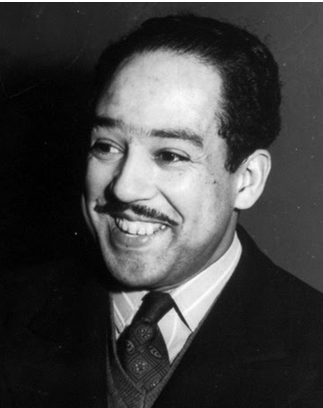Langston Hughes
Black Authors Post, Day 6.

Black Authors Post, Day 6.
Today’s author is poet, playwright, novelist and activist Langton Hughes.
Charles Mercer Langson Hughes was born in 1901, in Joplin, Missouri. His parents separated soon after he was born. Hughes was raised mostly in Lawrence, Kansas, by his grandmother, Mary Langston. He started writing prolifically at a young age, at one point being elected the class poet. In high school, Hughes edited the yearbook, wrote for the school newspaper, and began to write his first short stories and dramatic plays.
After he graduated from high school, Hughes moved to Mexico to live with his father, in a bid to convince him to assist him in attending Columbia University. Hughes’ father was not supportive of his son’s dream of becoming a writer. They compromised: Hughes would study engineering, and his father would support him in attending Columbia.
Hughes attended Columbia in 1921, but dropped out after a year after dealing with frustration at prejudice from professors and fellow students. After leaving Columbia, Hughes traveled the world, working in a series of odd jobs, and continued to write. In 1921, his first published piece of work, a poem titled “The Negro Speaks of Rivers”, was printed in The Crisis, the official magazine of the NAACP. He would go on to publish more poetry, and his first collection of poetry, The Weary Blues, was published in1926.
In 1926, Hughes enrolled in Lincoln University, and earned a BA. After he graduated from college, he moved to New York City, and became one of the most influential writers and thinkers of the Harlem Renaissance of the 1920s and 30s. He worked and collaborated with several of his contemporaries, like Zora Neale Hurston, Wallace Thurman, Claude McKay, Countee Cullen, Richard Bruce Nugent, and Aaron Douglas. Hughes published his first novel, Not Without Laughter, in 1930, and it won a Harmon Gold Medal that same year. In 1935, Hughes received a Guggenheim Fellowship, and wrote his first screenplay for the movie Way Down South. Hughes wrote novels, short stories, plays, poetry, operas, essays, and works for children. From 1942 to 1962, he wrote an in-depth weekly column in a leading black newspaper, The Chicago Defender.
In 1967, Hughes died in New York City at the age of 66, from complications after abdominal surgery related to prostate cancer. His ashes were interred beneath a floor medallion in the middle of the foyer in the Schomburg Center for Research in Black Culture in Harlem.
Some of my favorite Langston Hguhes works:
- The Big Sea (autobiography) - https://smile.amazon.com/Big-Sea-Autobiography-American-Century/dp/0809015498/
- The Collected Poems of Langston Hughes - https://smile.amazon.com/Collected-Langston-Hughes-Vintage-Classics/dp/0679764089/
A note: These Amazon links point to Amazon Smile, Amazon’s affiliate charity program. If you have not set up Amazon Smile, I encourage you to point it to an organization like Truartspeaks, a group that works with youth from 13-24, “Facilitating change through cultural production, arts education, youth development and community engagement.”
Some links to learn more about Langston Hughes:
- Poetry Foundation website profile - https://www.poetryfoundation.org/poets/langston-hughes
- Library of Congress works - https://www.loc.gov/rr/program/journey/hughes.html